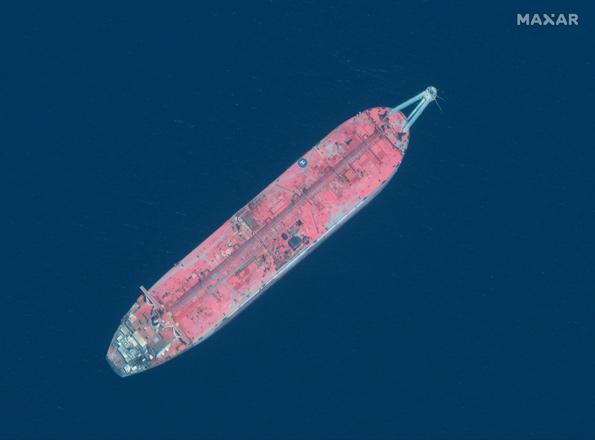You are here
Impasse leaves ‘time bomb’ oil tanker off Yemen
By AFP - Aug 16,2020 - Last updated at Aug 16,2020
SANAA — Houthi rebels and the UN are again at an impasse over a loaded oil storage tanker decaying off Yemen, despite parallels to this month's catastrophes in Beirut and Mauritius.
The 45-year-old FSO Safer, abandoned near Hodeida Port since 2015, has 1.1 million barrels of crude on board, and a rupture or explosion would have catastrophic environmental and humanitarian consequences.
The Iran-backed Houthis, who control much of Yemen's north, have blocked the United Nations from sending a team of inspectors to assess the vessel.
In July they finally gave the green light, but the UN has said in recent days that the necessary permits have not yet been forthcoming.
"The tragic Beirut explosion on 4 August, and the recent alarming oil spill in Mauritius demand the world's vigilance and urgent action to avert preventable loss of life and livelihoods," UN Secretary General Antonio Guterres's spokesman said on Friday.
The UN Security Council held a special session last month to express fears of a "catastrophe" if the tanker leaks into the Red Sea.
Its condition is "deteriorating daily" with no maintenance in the scorching Gulf heat, it said — like the cargo of hazardous materials abandoned for years at Beirut Port that exploded like a time bomb.
Used as a floating storage platform, the ship is laden with crude worth some $40 million.
Like other economic and aid issues in Yemen, where a long civil war has created poverty and chaos, the plight of the tanker has turned into a bargaining chip.
The Houthis stand accused of using the threat of disaster to secure control of the cargo's value.
Hicham Charaf, foreign minister in the Houthi administration which is not internationally recognised, said on Saturday the dispute now centres on the process for repairing the tanker.
The rebels insist that a UN inspection team evaluates and repairs the vessel in a single visit, he said.
Independent assessment
"We want to have an assessment and work to start immediately," Sharaf told AFP. "Some UN teams take a lot of time and we don't want that."
The rebels, who have accused the UN of bias towards Yemen's internationally recognised government, also demand that a third country, possibly Sweden or Germany, supervise the process.
The UN said on Friday it needs to first evaluate the problem and do immediate repairs, and then decide what further work is needed and what equipment and resources are required.
"Planning and executing a sustainable solution will not be possible without independent experts first assessing the damage," it said.
"And the assessment cannot be completed if the experts are not granted the required visas and permits to deploy to the tanker."
Apart from corrosion to the ageing vessel, essential work to curb explosive gases in its storage tanks has been neglected for years.
Experts say the latest problem cropped up in May with a leak in a cooling pipe that sent water into the engine room.
The UN has said an oil spill could destroy Red Sea ecosystems, shut down the fishing industry and close Yemen's lifeline Hodeida Port for six months.
More suffering for Yemenis
That would lead to huge spikes in the cost of food and fuel, in a country where a large majority of people are already dependent on aid.
If a fire breaks out, some 8.4 million people would be exposed to harmful levels of pollution.
Other countries bordering the Red Sea would be affected, including Djibouti, Eritrea and Saudi Arabia.
Total losses from a spill could amount to $1.5 billion over 25 years, the UN warned.
Greenpeace said in a report this week that time is running out and "inaction is no longer an option".
"Unless the UN acts, we risk sleepwalking into a disaster of international significance that will heap even more misery and suffering on millions of Yemenis," it said.
Ian Ralby, CEO of IR Consilium, a global maritime consultancy which follows the vessel closely, said a breach of the Safer could dwarf the emergency in Mauritius, where last month a Japanese-owned ship struck a reef and began oozing oil.
"The horrific spill in Mauritius, which has caused tragic harm to the marine environment there that will likely last a generation, is less than one percent of what the spill of the Safer will be," he told AFP.
Ralby said the vessel appears to be past the point of repair, and that if the Houthis are determined to keep the oil at sea, the crude could instead be simply pumped into a seaworthy tanker — rather than pursuing the troubled UN inspection process.
"Another option would be to ignore the warnings, ignore Beirut, ignore Mauritius, and let the gamesmanship and brinksmanship continue until we find out how catastrophic a spill that large really is," he said.
Related Articles
UNITED NATIONS, United States — The United Nations Security Council called on Houthi rebels to allow inspectors to visit a long-abandoned fu
DUBAI — Yemen’s Houthi rebels confirmed they have given the green light for a UN mission to inspect and repair a long-abandoned fuel tanker
SANAA — Yemen's Houthi rebels said Wednesday they are "ready" to allow a UN mission to inspect a long-abandoned fuel tanker which threatens



















